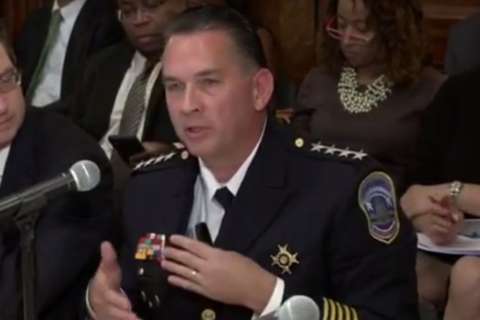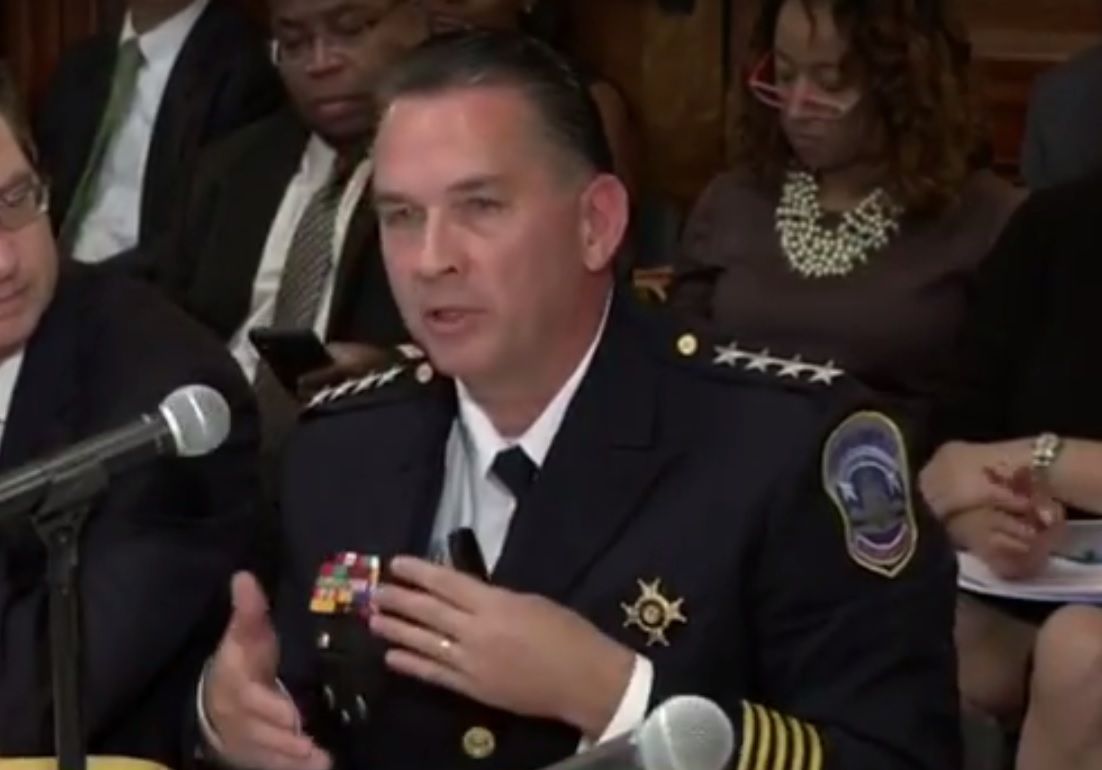
WASHINGTON — For roughly five hours on Thursday, a D.C. Council committee heard complaints, allegations and anecdotes from city residents unhappy with the police department, ranging from leadership to the rank and file on the streets. Their common thread was doubt about how committed the department is to transparency, especially after several recently implemented initiatives.
Then, in his own testimony to the Committee on the Judiciary and Public Safety, Police Chief Peter Newsham said, “Our community should be confident that all allegations of use of force are investigated thoroughly and impartially. We must continue to strive to meet high expectations for both uses of force and accountability in this arena.”
Before the hearing in the Wilson Building, Michael G. Tobin, the director of the Office of Police Complaints, said that for the second year in a row the number of complaints filed against officers was at a record level. Most of the officers, however, were exonerated, he said.
There was also an increase in the number of incidents where an officer used force, though there’s been a drastic reduction in the number of times officers discharged their service weapons.
Violent crime in the District is down overall, but the murder rate has shot up. Newsham said while the number of shootings in the city has been consistent, more of them have turned deadly. “The shootings appear to have been more lethal for a number of reasons,” said Newsham, “including that they were more likely to happen during the day, at close range, and with more shots being fired.”
Motives behind the increase in murders ranged from domestic violence to robbery. But Newsham also said there’s been an increase in violent retaliations among street gangs too. “In recent years the category of petty disputes between known participants has been on the rise. The one common thread is the prevalence of illegal firearms. Nearly 80 percent of our homicides were gun-related.“
Much of the hearing focused on the department’s relationship with city residents, both at the macro and micro level. “A strong relationship between the community and police is absolutely essential to success,” said Newsham, who called it his top priority since taking over the department.
But those who testified before the council said the police still had a long way to go.
“The community doesn’t trust the police when they frisk 11-year-olds and then refuse to answer questions about it,” Denise Krepp, a commissioner in ANC 6B10, told WTOP. She said the department initially tried to charge her $5,000 last December so she could compare police body-cam video taken by the police at an incident in her Hill East neighborhood with cellphone video taken by residents. When she asked for a waiver as an ANC commissioner, she says she was told she could not see the video.
Complaints about access to bodycams were echoed by other ANC commissioners who testified that the department makes it hard to build trust. “[The police] try to criticize residents in our community that pull out their phones and record these incidents (of alleged misconduct) because again, no one wants to believe us when we speak,” said Anthony Lorenzo Green, ANC 7C04 commissioner, who represents Deanwood. “[They] come back and say ‘Oh well, the body-cam footage shows a different story,’ but you don’t want to show us that story.”
“This is not a progressive program in the District of Columbia,” he argued. “And any time the public shows their own videos [the police] discount it and say it’s not real, it’s not accurate.”
Activists who testified accused the department’s leaders of trying to cover up misconduct.
“We get approached by police officers all the time, especially black police officers, who tell us about the retaliation that they face in trying to report these things,” April Goggans, a core organizer of Black Lives Matter DC, said before the hearing.
“Police interactions, just walking by random groups of black men, asking them to show their waistband, is something that’s been happening in DC since the ’70s,” Goggans said. “It’s allowing [the police] to do illegal stop-and-frisks on a daily basis of whole groups based on no evidence, no reasonable suspicion.”
At times the testimony got incendiary, and both Newsham and Sgt. Steven Bigelow, who leads the DC Fraternal Order of Police, were interrupted during their testimony.
“I’m just shocked by some of the comments I’ve heard today,” said Bigelow, who began by ditching his prepared statements in order to respond to what others had said in the hearing. “Some of the things I’ve heard: ‘Violent, killer cops.’ ‘Terror.’ ‘We don’t need more cops.’ ‘Shoot first, ask questions later.’
“My officers are not terrorists. Nor do they desire to engage in terrorism. Al Qaeda is terrorists. We have terrorists in the community that murdered 160 of our residents. The individuals that murdered Makiyah Wilson are terrorists. But my police officers are not.”
But Ward 7 Councilmember Vince Gray said the image of the department that police leaders were portraying in the hearing just doesn’t match what too many people in some of the city’s neighborhoods experience.
“I’m pretty much a data-driven person myself,” he said. “But anecdotal information is often an illustration of something that needs to be addressed.”
Newsham agreed, saying, “That is a challenge for us every single day, and I am with you that that is a challenge and it is our responsibility as a police department to achieve that.”
But he also argued that many allegations of misconduct or illegal actions, including ones that go viral, tend to be rooted in falsehoods.
“We’ve got to be honest when we discuss these issues, and talk about exactly what happened,” countered Newsham.









